Pezeshkian blames Iran’s woes on mismanagement, not US pressure
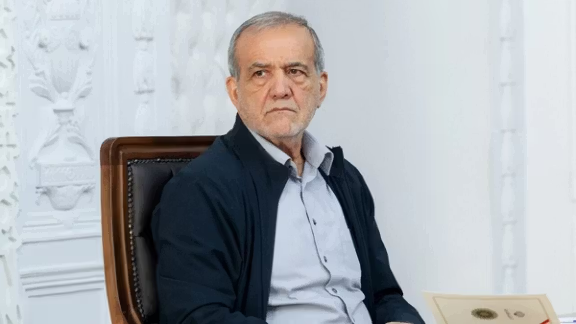
Iran’s economic and social difficulties stem from mismanagement by its own officials rather than from US pressure, President Masoud Pezeshkian said on Thursday.

Iran’s economic and social difficulties stem from mismanagement by its own officials rather than from US pressure, President Masoud Pezeshkian said on Thursday.
“We are lying on wealth yet remain poor because of ourselves — the managers, officials, politicians and lawmakers — not America,” Pezeshkian said at a meeting of education managers in the central city of Isfahan. He urged local authorities to depend on people’s capacities instead of waiting for the state to act. “If you rely on the government, nothing will change in fifty years. But if you trust the people, you can achieve anything,” he said.
Pezeshkian said the growing desire among young Iranians to emigrate was troubling and reflected a loss of faith in the country’s future. “Why should our children think about leaving?” he asked. “Going abroad to study and learn is not bad, but believing that they must go and never return is a disaster,” he said. The president urged young people to gain knowledge overseas and bring it back to serve their homeland.
Warning over internal conflict
Iran’s main threat comes from domestic divisions rather than from the United States or Israel, Pezeshkian said. “I am not afraid of America or Israel. I fear our own disputes,” he said. “If we fight each other, we do not need enemies. We destroy ourselves.”
Pezeshkian voiced similar concerns on Wednesday, saying at a cabinet meeting that political infighting was a greater danger than foreign hostility, the state news agency IRNA reported. “I have no serious concern about plots by the United States or others, because their hostility is obvious,” he said. “But I am deeply worried about false divisions and efforts to blacken everything inside the country.”
Hardline lawmakers have opened impeachment moves against four of his cabinet ministers this month in what critics say is an attempt to paralyze his government. Pezeshkian, a relative moderate, has urged cooperation to restore public trust and ease growing hardship under renewed sanctions.
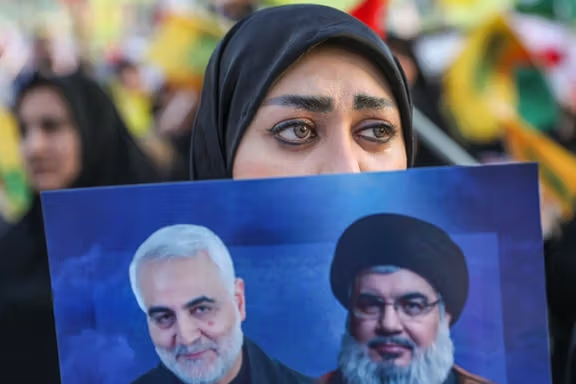
US President Donald Trump’s repeated entreaties for Iran to agree to Mideast peace in remarks at the Israeli Knesset and Sharm al-Sheikh on Monday has drawn mixed reactions in Tehran as diplomatic isolation and economic pain bite.
Trump urged Iran to recognize Israel and accept Washington’s conditions, telling Iranian officials, “We are ready when you are … It will be the best decision that Iran has ever made ... I’m telling you, they want to make a deal.”
However, he set some conditions: “Nothing would do more good for the Middle East than for Iran’s leaders to renounce terror, stop threatening their neighbors, quit funding their militant proxies, and finally recognize Israel’s right to existence.”
Iran’s Foreign Minister Abbas Araghchi rebuked Trump, accusing him of combining contradictory roles.
Tehran, Araghchi said, remains open to “respectful and mutually beneficial diplomatic engagement,” but would not “accept being used as a pretext for normalization with Israel under unjust terms.”
'They want an obedient Iran'
State media emphasized Tehran’s wariness, declaring Iran’s hesitation stems from a “lack of trust.”
“Iran's return to the negotiating table will not come through an invitation to Sharm el-Sheikh or through threats made in the Tel Aviv Knesset, but only through respectful and reasonable conduct," the government-run news outlet IRNA wrote.
"This is the first principle of engaging in talks with Iran—so that any negotiation can become a win–win deal for both sides.”
The Revolutionary Guards (IRGC)-linked Tasnim News Agency described Trump’s peace proposal as “part of a broader strategy to impose America’s will on Iran."
Fars News Agency, also linked to the IRGC, cited Khamenei's remarks in August: “Those who argue over why we do not negotiate directly with the US are superficial in my view. The essence of the matter is not like that; this issue is insoluble. They want Iran to be obedient to the United States.”
Ultra-hardline social media voices suggested talks should occur only after demonstrating strategic strength.
“From Trump’s statements at the summit and the Knesset, it is clear that he seeks Iran’s complete submission, to the extent that Iran would even recognize Israel," conservative commentator Erfan Pazhuhandeh wrote on X.
This means that neither war nor tensions is entirely off the table.”
'Iran never denied Jew's right to live'
Reformists and moderates insist engagement is the only viable path.
Former President Hassan Rouhani, addressing former government officials after the Sharm el-Sheikh summit and Gaza peace agreement, said, “Negotiating with the world is difficult but possible, and the binary choice of war or surrender is incorrect.”
He urged Iran to find “another path, which is the path of engagement.”
Commentator Mohammad Sadegh Hosseini told Etemad that Trump has both the motivation and capacity to reach a deal before US midterm elections, but any agreement depends on Iran.
He argued that two of Trump’s three conditions—refraining from supporting terrorists and avoiding regional hostility— are manageable. The third, recognition of “Israel’s right to existence”, as Trump put it, “could potentially be achieved through practical mechanisms, he argued.
“Iran has never denied the right of Jews to live," he added." Planning can be done in a way that aligns with Iran’s fundamental strategies.”
Reformist politician Ahmad Shirzad told Etemad that only a practical, actionable proposal with clear negotiation terms would allow Iran to properly assess the offer.
“Public discussions like these—remarks at the Knesset or Sharm el-Sheikh—are neither reassuring nor alarming,” he added.

Hundreds of inmates in Iran’s Ghezel Hesar Prison near Tehran are refusing food in protest against a recent rise in executions, as at least five more prisoners were put to death on Wednesday.
Detainees in the notorious lockup outside Tehran rejected their food rations for the third consecutive day, sources told Iran International.
Several inmates fainted on the third day of the strike, according to videos from inside the prison shared online.
"The Islamic Republic is carrying out a massacre in this prison," one inmate said in a video sent to Iran International, describing the continuation of the collective hunger strike in protest against death sentences.
The strike comes as Iran has executed at least 1,172 people this year, according to the US-based Abdorrahman Boroumand Center for Human Rights in Iran.
The protests began on Monday in wards 1 and 2 after the transfer of a group of prisoners to solitary confinement.
At least 19 prisoners had been moved to solitary confinement pending their execution this week, 11 of them on drug-related charges and three on murder convictions, according to US-based rights group Human Rights Activists News Agency (HRANA).
The prison has seen a sharp rise in executions in recent weeks, according to HRANA.
'We will all be killed'
Prisoners in Ward 4 issued a statement describing the daily transfer of their cellmates to solitary confinement, saying they have “no choice left but to protest and go on strike.”
“There is not a single day when our cellmates are not taken to solitary confinement for execution. If we are left alone after these protests, we will all be killed,” the statement added.
Death-row inmates at the prison, in a separate statement published on Iranian rights activist Golrokh Iraee’s X page, said nearly 1,500 prisoners were on strike and called on the public to support their cause and gather outside the prison to protest the rising number of executions.
"These are the most agonizing moments of our lives and those of our families — suffering that has gone on for years. This situation has become unbearable for us," the statement said.
"Our only refuge as prisoners is you, the dear people of Iran. Execution is not our right... Take action against executions in Iran. Raise your voices. Gather outside the prisons and do not let them execute prisoners," it added.
Five executed in one day
Iran’s judiciary-affiliated Mizan News Agency on Wednesday said that three men — Amirreza Ghobadi, Majid Hatami, and Sajjad Hatami — were executed at Ghezel Hesar prison after being convicted of moharebeh (enmity against God) through armed robbery.
HRANA reported that two others convicted of murder were also executed on Wednesday in the same facility.
The five were among at least 19 inmates transferred to solitary confinement for execution.
One prisoner sentenced to death for the murder of Amir Mohammad Khaleghi, a University of Tehran student, was returned to his ward after the victim’s family granted a two-month reprieve.
There has been no information on the fate of the remaining prisoners transferred to solitary confinement.
Families join protest outside prison
On Tuesday night, families of death-row inmates gathered outside Ghezel Hesar Prison, holding photographs of their loved ones and chanting “do not execute” and “immediate abolition of the death penalty.”
The protest coincided with the No to Execution Tuesdays campaign.
The campaign entered its 90th week this Tuesday, with prisoners in 52 prisons across Iran joining the hunger strike.
The No to Execution Tuesdays campaign began in January 2024, launched by political prisoners in the prison to protest the rising number of executions across the country.
The initiative quickly gained momentum, spreading to dozens of prisons in Iran, including the women’s ward at Evin Prison, where inmates joined the weekly hunger strikes and issued statements calling for the abolition of the death penalty.
Ghezel Hesar’s record of executions
Located in the city of Karaj, west of Tehran, Ghezel Hesar is one of Iran’s largest and most notorious detention centers, where executions are routinely carried out.
In a report marking the World Day Against the Death Penalty last week, HRANA said at least 1,537 people were executed in Iran between October 2024 and October 2025, including 183 in Ghezel Hesar — the highest number recorded in any prison in the country.

President Masoud Pezeshkian said on Wednesday he was more concerned about political infighting than threats from the United States, state media reported, as the relative moderate faces increasing opposition from hardliners.
“I have no serious concern about plots by the United States or others, because their hostility is obvious,” Pezeshkian told a cabinet meeting, state news agency IRNA quoted him as saying in a cabinet meeting.
“But I am deeply worried about the spread of false polarizations, divisions, and constant efforts to discredit and blacken everything inside the country.”
Hardline lawmakers have four of Pezeshkian’s cabinet ministers in their crosshairs for impeachment proceedings they launched this month, in what critics say is a bid to stall the government rather than to offer alternatives.
'People despair'
The conservatives have reportedly tabled motions against Energy Minister Abbas Aliabadi, Roads and Urban Planning Minister Farzaneh Sadegh, Agriculture Minister Gholamreza Nouri and Labor Minister Ahmad Maydari.
“Such behavior fuels anger, anxiety, and despair among the people. In these circumstances, we must all join hands and take positive steps together to overcome the difficult times ahead and give people hope,” Pezeshkian added, without specifically addressing the moves by his opponents.
The return last month of UN sanctions triggered by European powers has further hobbled Iran's economy after a punishing conflict with Israel and the United States in a 12-day war in June.
The reimposition of the so-called "maximum pressure" campaign of sanctions by US President Donald Trump has also piled pressure on the government.
“I can handle foreign issues, but I am worried about our internal problems,” Pezeshkian added.
Chronic division
Ideological clashes have limited his ability to advance campaign promises to reduce diplomatic isolation and improve standards of living.
Despite repeated calls for unity, divisions over foreign policy and domestic priorities continue to stall cohesion within Iran’s political establishment.
Iran declined to attend the Gaza peace summit hosted by Egypt this week, signaling a deliberate diplomatic snub amid deep regional tensions.
Foreign Minister Abbas Araghchi said Iranian diplomats could not “sit with countries that have attacked the Iranian people and continue to threaten and sanction us."
The commentariat in Tehran remain divided about the wisdom of the snub. Some view the boycott as a principled stand against Western and Arab pressure, while others see it as a missed opportunity to influence postwar diplomacy in the region.
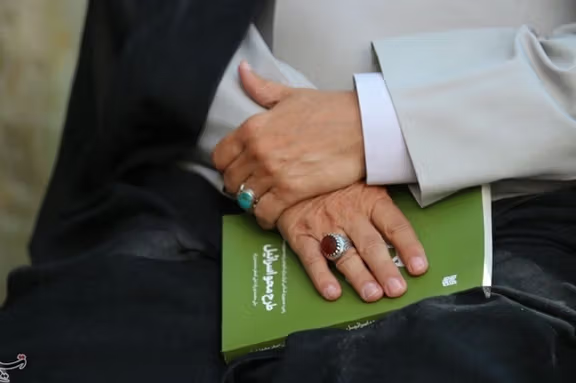
A senior cleric close to Iran’s Supreme Leader on Tuesday unveiled a state-published book outlining what it calls Tehran’s plan to destroy Israel.
The book, titled “Israel Annihilation Plan: The Islamic Republic's Strategy for the Destruction of the Zionist Regime,” was presented at an event in Iran's holy city of Qom.
The presentation suggested that despite a Gaza ceasefire which could tamp down region-wide conflicts over the past two years, Tehran was far from retiring its hostility and harsh rhetoric toward its regional arch-enemy.
Alireza Panahian, a cleric close to supreme leader Ali Khamenei, praised the authors during the unveiling ceremony, calling the book a valuable step in elaborating on the views of Khamenei and his predecessor Ruhollah Khomeini.

'Khamenei a hero'
Since the 1979 Islamic Revolution led by Khomeini, Iran has made opposition to Israel a core feature of its state ideology.
Under its founding leader, Israel was denounced as a “Zionist regime” lacking legitimacy, and it was cast as a symbol of Western imperialism in the Muslim world that must be annihilated.
Over time, this rhetoric has been echoed and expanded by his successor Khamenei, who has repeatedly called Israel a “cancerous tumor” and forecast its eventual demise.
In the ceremony held at Qom's Shrine of Hazrat Fatima Masoumeh, Panahian said “in the aftermath of the 12-day war (with Israel in June), the Supreme Leader’s name is recognized worldwide as that of a hero who stood up against the global order of domination."
Israel launched a surprise military offensive in June, striking Iran’s military and nuclear facilities as well as targeting top officials. Iran retaliated with salvos of drones and ballistic missiles.
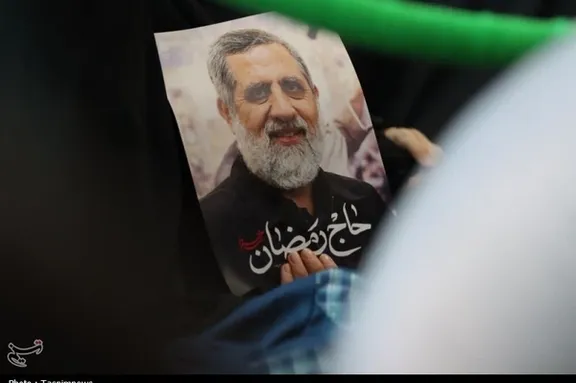
'Israel's Irreparable defeat'
Author Ali-Asghar Mohammadi-Rad told attendees the book delved into "the theoretical and strategic foundations of Iran's plan to end the life of this regime, as well as an analysis of Israel's irreparable defeats in the recent battle."
"In the final chapter of the book, the connection between the recent 12-day war and the Islamic Republic of Iran's grand strategy of collapsing the Zionist regime is explained, and it is shown that this battle is part of the process of realizing that same strategic plan," he added, according to Tasnim news agency.
The book's back-cover blurb praises the October 7, 2023, attack by Tehran-backed Hamas militants as "a wake-up call for Iran and the entire world."
"The global public—poisoned by the stench of lies and worldliness spread by their rulers—needed to hear the cry of Palestine’s oppression, and the fabricated oppression of (Jewish people in) the Holocaust should sound for them as a bell of disgrace and a cry for freedom," it said.
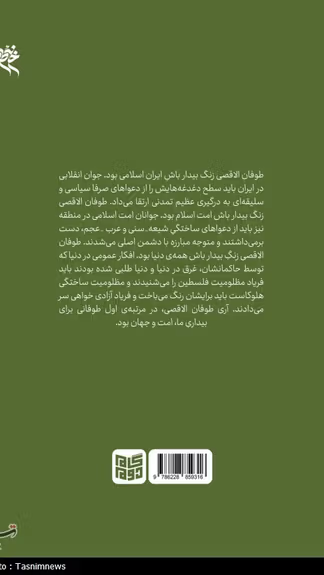

The Gaza summit in Egypt and Iran's refusal to take part have ignited fierce debate in Tehran over diplomacy and regional strategy as US president Donald Trump moves to reshape the Middle East.
While hardline media aligned with the establishment condemned the summit outright, reformist and moderate voices turned their criticism inward, questioning the government’s decision to boycott the meeting and the reasoning behind it.
Hardline daily Jam-e Jam, run by state broadcaster IRIB, headlined its front page “The Shameful Summit.”
The gathering, the daily wrote, was not a symbol of peace, but "a stage for diplomacy wearing a mask of empathy — while the same actors keep the fires of war burning.”
'Resistance miracle'
Javan, linked to the Revolutionary Guards (IRGC), was more bullish.
“Does anyone in the West truly believe they ‘won the war’ and can dictate postwar conditions?” the daily asked in an editorial. “The new order favors the Resistance Front and the Islamic Republic, to the detriment of Israel and Saudi Arabia.”
The ultra-conservative Kayhan, funded by the Supreme Leader’s office, had the answer to Javan’s rhetorical question.
“The Zionist regime failed to achieve any of its military goals and had to negotiate with Hamas,” Kayhan wrote under the front-page headline “The Miracle of Resistance.”
Hamshahri, run by Tehran’s municipality, backed Iran’s decision to decline Egypt’s invitation, calling it “an effort to rescue Netanyahu from the Gaza quagmire through negotiation with Hamas.”
Hardline commentator Mohammad Nadimi issued a harsh warning.
“Sharm el-Sheikh is the completion of the Arab-Israeli-American alliance for a new Middle East. Join it, and we give up the islands, missiles, enrichment and drones; refuse, and we must prepare for war to restore balance,” he posted on X.
‘Peace hanging in balance’
Tehran moderates offered a more restrained response — with the reformist daily Shargh splashing “Peace on a Razor’s Edge” on its Tuesday front page.
“Whether Iran views this ceasefire as an opportunity to consolidate influence or a temporary setback depends on Washington’s policy toward Tehran and its regional competition with Riyadh,” the paper’s editorial read.
Former presidential aide Mohammad Ali Abtahi highlighted the human loss in Gaza.
“Two years ago neither Hamas imagined accepting peace after 65,000 martyrs and Gaza’s destruction, nor Israel thought it would end up signing a peace deal with the group it calls terrorist,” he wrote on X.
Former ambassador Nosratollah Tajik questioned the efficacy of the summit.
“Trump’s speech at Sharm el-Sheikh, with no mention of the Palestinian people, shows he does not intend to address the roots of the conflict. Without a Palestinian state and refugee settlement, this is just another painkiller, not a cure.”
Isolation or Strength?
The government-run Iran daily defended the decision to skip the summit, calling it a “Trump spectacle” to compensate for not winning a Nobel Peace Prize.
Tehran’s refusal to be part of the show, the paper said, underscored its “independent role amid geopolitical rivalries and chronic mistrust.”
But the reformist Ham Mihan rebuked that logic.
“If that is the case, why did you seek meetings with them (the Americans) at the United Nations?” it asked in its Tuesday editorial. “Such reasoning may appear principled but isolates the country further and defines Iran as outside the existing world order.”
Political analyst Majid Younesian, writing in the same paper, urged realism.
“Declining Egypt’s invitation is neither a waste of diplomatic opportunity nor a trap. The truth is that Iran’s state apparatus is still not ready to alter its approach toward engagement with the West,” he wrote.